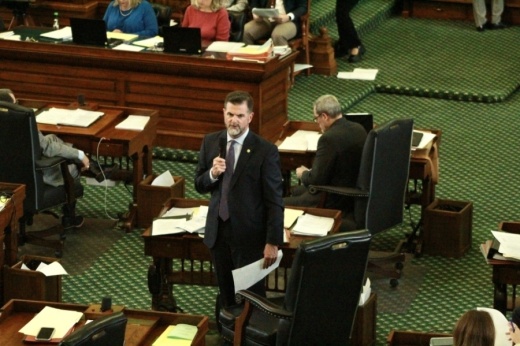The controversial proposal is a top priority of Gov. Greg Abbott. He directed lawmakers to tackle “education freedom” and other topics during the third special legislative session of the year, which began Oct. 9.
Senate Bill 1 would create a voucher-like program called education savings accounts. Families could apply to receive $8,000 per child to pay for private school tuition, books, tutoring, transportation and other educational expenses.
“We must recognize that a one-size-fits-all approach doesn't always address the varied needs of our diverse student population,” bill author Sen. Brandon Creighton, R-Conroe, said.
After over eight hours of debate and 14 hours in session, senators passed the bill with an 18-13 vote. Sen. Robert Nichols, R-Jacksonville, voted against the bill with all 12 Democrats.
The proposal now heads to the House, where its future is unclear. Democrats and rural Republicans in the lower chamber have historically opposed similar legislation.
"Let me be abundantly clear: the Texas Senate will pass this bill over and over again until the Texas House passes it and sends it to Gov. Abbott’s desk," Lt. Gov. Dan Patrick said in a statement following the vote.
The details
Creighton said over 60,000 students would qualify for the program, which would cost the state $500 million for the 2024-25 biennium. Roughly 5.6 million students attend Texas public schools.
SB 1 would prioritize students from low-income families and students with disabilities.
Students enrolled in public or private schools, as well as those enrolling in kindergarten or pre-K for the first time, could receive $8,000 per year. The money could only be used at accredited private schools.
Homeschooled students could qualify for $1,000 to cover materials and other expenses.
This would give families “a fighting chance [to] meet students’ educational needs,” Creighton said.
Public school districts with fewer than 5,000 students would receive $10,000 per year each time a student leaves their district to attend a private school. The allotment would be available for three years after students leave a district.
This would help protect small rural schools from losing money or closing as students leave, lawmakers said.
Children of state officials, including lawmakers, would not qualify for the program.
The other side
Democratic senators grilled Creighton about why private schools receiving taxpayer money would not have to meet the same standardized testing and financial transparency requirements as public schools.
“If we're using public dollars, there should be a system of publicly administered accountability,” Sen. Nathan Johnson, D-Dallas, said.
Creighton said he did not want to “impose additional restraints or audits” on private schools. However, at the request of Democrats, the state would be required to collect demographic information about students who receive program funds.
Other lawmakers questioned why all taxpayers should pay for private education.
“We talked about [SB 1] being parental empowerment and choice,” Sen. José Menéndez, D-San Antonio, said. “What about the taxpayers who are being asked to share and subsidize that cost?”
Sen. Roland Gutierrez, D-San Antonio, countered arguments from Republicans that students could use the program to escape failing public schools.
“If education is so bad, Republicans have been in power in this state for 30 years—why haven't we found the fix in our schools?” Gutierrez asked.
What else?
Senators also passed SB 2, a public school funding proposal by Creighton, with a 30-1 vote late Oct. 12. The bill would set aside $5.2 billion for teacher pay raises, per-student funding and school safety.





